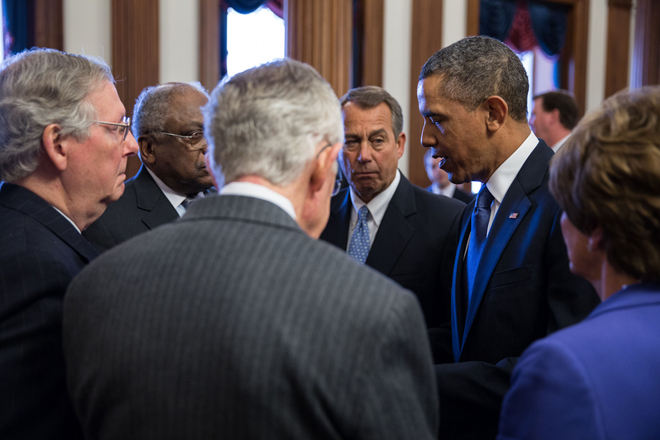This week’s announcement by the Treasury Department that the federal government will max out its credit card in mid-October narrows the window of time Congress has to avoid both a government shutdown and avert debt default.
When lawmakers return on Sept. 9, they’ll have just nine working days to keep the government funded as of Oct. 1, and a mere seven more working days to make sure the country can keep paying its bills, according to the House calendar.
Speaker John Boehner (R-OH) will make the first move as Senate Democratic leaders watch closely. He has primed expectation among Republicans to continue funding the government temporarily at agreed-upon levels, and the two sides appear ready to agree on that. But the bigger fight is what comes next: the debt limit. Here Boehner has been ratcheting up expectations and vowing to fight the White House, which has promised that it will not negotiate on the issue.
It’s virtually impossible to know how the battle will play out. But based on conversations with White House and congressional staffers, here are the four broad ways the debate could go.
1) Boehner Fails To Pass A Bill, Handing The Initiative To Senate Democrats
Boehner is unable to come up with a debt limit solution that’s palatable to enough of his members and can pass the House. As a result, Senate Democrats seize the initiative and bring along a contingent of moderate Senate Republicans to raise the debt limit cleanly, perhaps with some tweaks to sequestration. (In that scenario, senior Senate Democratic aides believe they can get 60 votes to break a filibuster.)
As time runs out, Boehner is forced to bring up the Senate bill and let it pass the House with mostly Democratic votes. His standing as Speaker is weakened.
2) Boehner Sets A Strong Bargaining Position And Wins Some Concessions
Boehner cobbles together 218 votes — probably all Republicans — to tie a debt limit increase to significant entitlement cuts, or a delay or defuding of Obamacare, or a combination of things. He sends this bill to the Senate, where Democratic leaders reject it.
Senate Republicans stand with Boehner and filibuster Democrats’ clean debt limit extension. Impasse. The White House’s vow not to negotiate on the debt ceiling is tested, and Democrats look for a way out. They refuse to give up entitlement cuts without revenues, or weaken Obamacare, but acquiesce to symbolic concessions such as allowing a Senate vote to delay the health care law’s individual mandate, instructions for initiating tax reform or another kabuki dance that falls short of policy concessions.
For this to work, Republicans would have to overcome their desire not to vote to cut safety-net programs like Social Security or Medicare in the near term without cover from Democrats.
3) Republicans Package The CR And Debt Limit Together
In this scenario, the continuing resolution and debt limit are folded into one big House bill. But this would likely rely on House Republicans passing legislation that packages the two items, because Democrats want to address them separately. That’s unlikely given the short time frame before a shutdown, and Boehner has said he’s leaning against it. If the House fails, the initiative goes to the Senate. But if they succeed, it would likely continue funding the government at sequestration levels and include spending cuts.
This could make things tricky if House Republicans unite around a solution that deals with both deadlines and stand firm. Democrats will still refuse to pay a random for lifting the debt ceiling, leading to a standoff. If things get down to the last minute, and Senate Republicans stand with House Republicans and filibuster Democrats’ alternatives, the White House will face pressure to look for a way out of the mess.
4) The White House Cuts A Deal With Republicans
In a breakthrough, the White House strikes a deal with GOP leaders to package a debt limit hike with unwinding or delaying sequestration. The specifics are very difficult to predict given the huge budget differences between President Barack Obama and Republicans. One possibility is the White House agrees to some entitlement cuts and perhaps secures user fee increases — tax revenues are off the table for Republicans.
Both sides save face: Republicans say they cut entitlements without raising taxes; the White House says it put off the sequester without negotiating on the debt ceiling.
This appears to be the least likely scenario, for similar reasons that have thwarted any grand bargain budget agreement in recent years, but it remains the White House’s ideal endgame. White House officials are scheduled to hold their latest of several meetings with rank-and-file GOP senators Thursday to discuss possible budget agreements, according to Politico.










